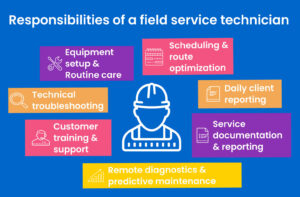Field Service Technicians are important to keep everything running. They install, repair, and maintain critical equipment at various sites. Whether working in telecommunications, IT, environmental services, or construction, these professionals keep essential systems operational. They perform their duties in central offices, mobile towers, outside plants (OSP), industrial sites, and customer locations, often requiring travel to multiple service areas.
Field service is undergoing a big change these days, with digital technology really shaking things up. More and more companies are embracing digital field service management solutions to simplify workflows, speed up real-time reporting, and boost customer satisfaction. Tools from Resco offer valuable features that help optimize service operations. For insights into the future of field service, explore this industry eBook.
Key responsibilities of a field service technician

Field service technicians are responsible for ensuring that equipment functions efficiently while maintaining high service standards. Their main tasks include:
- Equipment setup & routine care – They handle everything from installing new systems to performing regular check-ups. Their goal is to catch issues early, ensuring smooth operations and reducing downtime.
- Technical troubleshooting – They promptly identify issues within hardware, software, or infrastructure and implement effective solutions to restore functionality and prevent further disruptions.
- Customer training & support – Educating clients on how to operate newly installed or repaired equipment.
- Service documentation & reporting – Logging work progress, issue resolution, and parts replacements using Resco Mobile CRM for real-time updates.
- Scheduling & route optimization – Managing service appointments and optimizing routes efficiently.
- Remote diagnostics & predictive maintenance – Leveraging IoT and field service management tools to monitor equipment health and prevent failures before they occur.
- Daily client reporting – Preparing reports for each client on the same day service is provided to ensure accurate documentation and follow-ups.
When companies adopt Resco Field Service+, their technicians can quickly check customer histories, update tickets right on site, and get live task updates. This means they can respond faster and keep daily operations running smoothly.
Requirements and skills
You must have a combination of technical knowledge, physical and problem-solving skills. Standard qualifications include:
- Education – High school education required; technical degree or relevant certification preferred.
- Technical skills – Professionalism in troubleshooting and repairing technical devices.
- Physical resistance – Ability to lift up heavier items and stand for extended periods of time.
- Time management – Ability to handle multiple service requests.
- Customer service – Strong communication skills to explain complex technical issues to clients clearly.
- Adaptability & travel readiness – Comfort with traveling between multiple job sites and adjusting to shifting schedules.
- Familiarity with mobile tools – Proficiency in field service management software, such as mobile CRM solutions that automate checklists, reporting, and service workflows.
Technicians who adopt digital solutions can streamline workflows, reduce administrative overhead, and enhance service delivery efficiency.
How to become field service technician?
- University degree – A foundation degree in engineering, IT, or network technology can provide a strong knowledge base.
- Technical college courses – Certifications in mechanical engineering, electrical technology, or equipment maintenance are valuable. Common certifications include:
- Level 2 Mechanical Engineering Certification
- Level 2 Electrical and Electronic Engineering Technology Certification
- Level 3 Equipment Maintenance Engineering Diploma
- Level 3 Engineering Diploma
In order to take a college course, you may require the following:
- At least two 2 GCSEs in grades 9 to 3 (A* to D) or level 2 course
- 4 or 5 GCSEs in grades 9 to 4 (A* to C) or level 3 courses.
- Apprenticeships & on-the-job training – Many technicians gain experience through structured apprenticeships or internal training programs. An advanced apprenticeship may require qualifications such as:
- 5 GCSEs (grades 9 to 4 / A* to C) in English and Math.
- Some companies offer apprenticeships that do not require a degree but require 30 hours per week of on-the-job training.
Regardless of education, staying up to date with the latest field service technology, such as mobile CRM tools and automated inspection platforms, is essential for career growth.
How much does a field service technician earn?
Field service technician salaries vary depending on industry, location, and experience level:
- Entry-level technicians – Average $46,000 per year
- Mid-level technicians – Around $56,000 per year
- Senior level technicians – Around $70,000 per year
Additional incentives include overtime pay, performance bonuses, and company-provided tools such as vehicles, smartphones, and laptops.
Types of field service technicians & specializations
1. Environmental field technician
Field technicians monitor and analyze environmental conditions. Their main responsibilities are sample collection, pollution monitoring, environmental impact reporting, and regulatory compliance. They may also be required to operate heavier equipment to assess pollution. The qualification requires at least two years of specialized training or a degree in relevant fields. The required skills are perfect analytical thinking, experience with testing equipment, and understanding of environmental laws.
The average salary is $45,000 per year.
2. IT field technician
IT field technicians are responsible for installing, troubleshooting, and maintaining IT hardware and software systems. The work also includes on-site and remote support and complete diagnostics of technical faults. The main skills are networking expertise, certification in A+, Linux+, or Cisco, knowledge of storage and virtualization systems, software troubleshooting, and problem-solving abilities. A bachelor’s degree in Computer Engineering, Information Technology, or a related field is preferred.
The average salary is $45,000 per year.
3. Telecommunications field technician
Telecommunications technicians install and maintain fiber optic networks, telephone systems, WAN devices, and broadband connections. They work with residential and business clients, provision of constant communication services. Required abilities consist of understanding of telecommunications infrastructure, ability to work under pressure, and troubleshooting expertise.
The average salary is around $58,000 per year.
4. Computer field technician
Computer field technicians provide hardware and software support to individuals and organizations. They diagnose system malfunctions, monitor systems, upgrade components and systems, and assist clients with troubleshooting numerous problems. Most technicians hold a two-year associate degree in computer science, electronics, or fields related to IT. CompTIA A+ certification often helps. Technical skills include firm knowledge of PC components & desktop operating systems.
The average salary is around $47,000 per year.
5. IT field support technicians
IT field support technicians primarily handle IT-related tasks, they help the business by providing support to their computer system and fixing issues related to the equipment. Required qualifications are 1-3 years of experience with known devices like Windows, Apple, and Chromebook, A+, Network +, Microsoft, or Google certifications. Important skills are strong communication, problem-solving abilities, and system administration experience.
The average salary is around $47,000 per year.
6. Construction materials field technician
Construction materials field technicians test materials like concrete, asphalt, and soil to ensure they meet industry standards. They conduct quality control inspections on construction sites and work closely with engineers to ensure materials comply with safety regulations. A high school diploma is required, though many positions prefer a degree in construction-related fields. The required skills are understanding of construction materials, precision in testing procedures, and ability to work in the field.
The average salary is around $42,000 per year.
7. Archaeological field technician
Archaeological field technicians assist with excavations and historical research. They are responsible for uncovering historical artifacts, documenting findings, and analyzing ancient sites. The job requires extensive fieldwork, patience, and attention to detail as technicians work in remote locations. A bachelor’s degree in archaeology, anthropology, or a related field is typically required. Needed skills are knowledge of archaeology, physical endurance, and attention to detail.
The average salary is around $41,000 per year.
8. Field network technician
Field network technicians focus on network infrastructure. They install and maintain network equipment, configure security protocols, and monitor network performance for businesses and organizations. Their essential abilities are understanding of network administration, competence with routers and firewalls, and effective problem-solving capabilities. A bachelor’s degree in network engineering, computer science, or information technology is preferred.
The average salary is around $71,000 per year.
9. Senior construction materials field technician
Senior construction materials technicians oversee advanced material testing and compliance checks in construction projects. They work closely with civil engineers and project managers to ensure that materials used in infrastructure projects meet strict safety standards. Essential skills are extensive construction material knowledge, leadership skills, and regulatory understanding. A high school diploma is required, though a degree in civil engineering or construction management is beneficial.
The average salary is around $37,00 per year (entry-level, with potential for higher earnings based on experience).

Digitizing field service with Resco
Field service technicians work across many industries, using a mix of skills to get the job done. With the integration of modern technology, digital solutions like Resco Field Service+ play an important role in optimizing service delivery. Organizations that leverage these solutions are better positioned to reduce operational costs, enhance reporting accuracy and enhance customer experiences.
Resco’s toolset is being used by companies in the field to help them deliver faster, more reliable, and cost-effective services to their customers.
Think about running a field service operation. You want your team to be efficient, your reporting to be spot-on, and your customers to be thrilled. That’s where modern digital solutions come in. Tools like Resco Field Service+ are transforming how businesses handle field service.
Companies are experiencing significant improvements: faster task completion, reliable data, and increased customer satisfaction. For businesses seeking to advance, these digital tools are transformative, enabling quicker, more reliable, and cost-efficient services.